How to Keep Free-Range Chickens Warm in Winter
If you let your chickens out loose during the day, you may be wondering what you should do in the winter. If so, this article on how to keep free-range chickens warm in winter will give you a few tips you can use to keep your flock warm and dry.
Tips for raising chickens in the winter that will allow you to do the same routine and still keep your flock safe and thriving in the colder months.
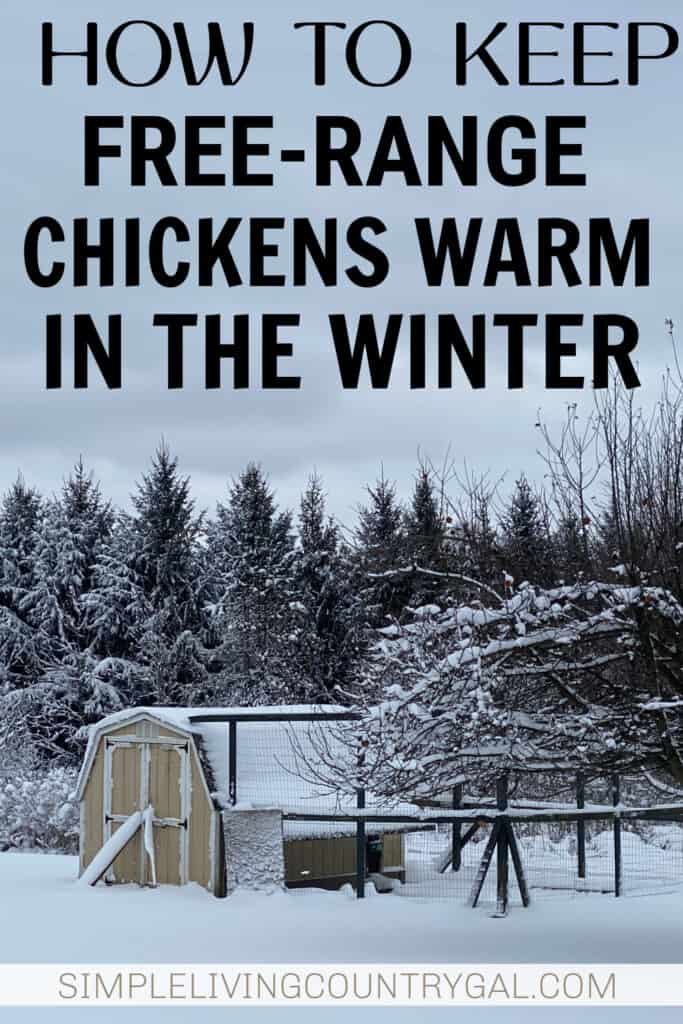
Winter is a time for staying indoors where it is warm and dry, but for homesteaders, we are outside all year long—feeding our animals, working on projects, and tending to plants growing in cold frames. Some like to lock their animals down in the wintertime, and that’s a good option. However, there are others who want to let their livestock out for fresh air and exercise. If you worry that doing so will hurt your animals, these tips will keep everyone safe and healthy.
What Does Free-Range Mean?
Free-range means giving your chickens the freedom to roam outdoors during the day without a fence to confine them. This allows them to forage and scratch using their natural behaviors of pecking for food.
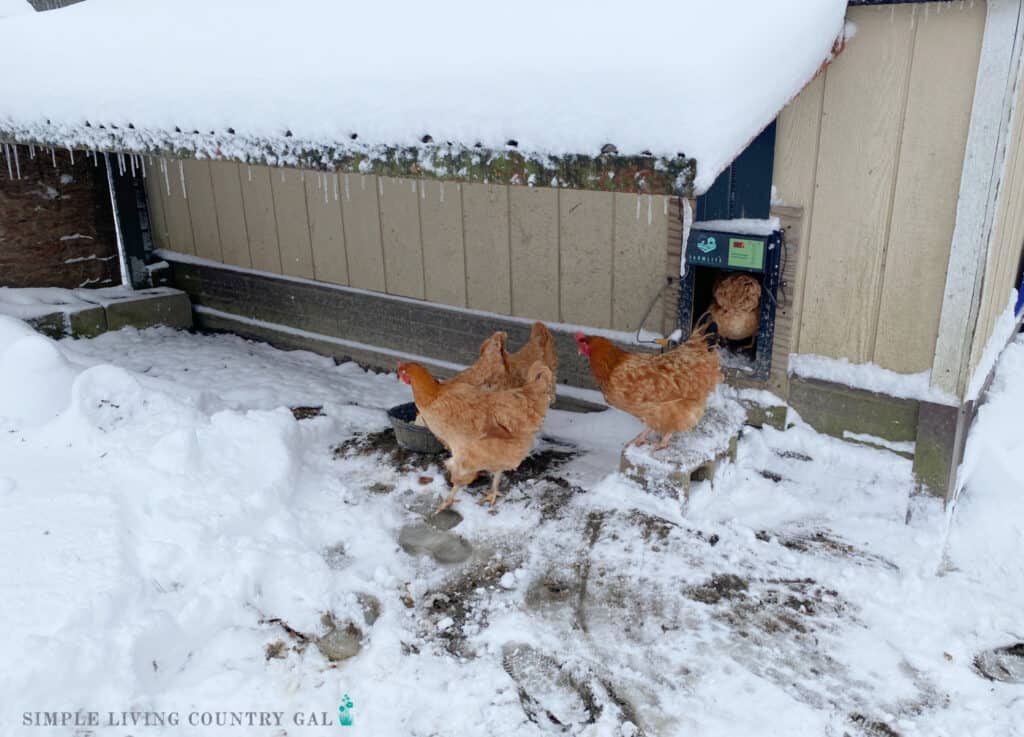
Can You Free-Range Chickens in the Winter?
Yes, you can free-range your flock in the winter, given you provide them with adequate protection and shelter from the weather.
The Challenges of Raising Free-Range Chickens in the Winter
Keeping free-range chickens warm in winter can be challenging, but it’s not impossible. The biggest challenge is keeping your flock dry and preventing them from getting frostbite on their combs and feet. Chickens are susceptible to the cold, especially if they have less feather coverage or live in colder climates. They need protection from wind, rain, snow, and temperatures that dip below freezing.
How do Chickens Keep Warm?
Chickens are naturally equipped with insulating feathers that help keep them warm in cold weather. They also huddle together for warmth and can fluff their feathers to create an air pocket for added insulation. Additionally, chickens have a higher body temperature than humans, which helps them generate their own internal heat.
Storey’s Guide to Raising Chickens, 3rd Edition


Tips for Raising Free-Range Chickens in the Winter
Below are a few outside tips for when your hens are out foraging for food.
#1. Provide Adequate Shelter
To ensure your chickens stay warm and safe during the winter, provide them with a well-insulated coop or shelter. This will protect them from the cold temps and winds, as well as the rain and snow.
For any chickens that free-range, you will want to be sure you give them easy access to the shelter so they can come inside whenever they feel the need. For our flock, we keep the run gate open as well as the coop door. This gives them a path to shelter in the front and back areas of the coop.
#2. Remove Any Snow/Create a Path
You will want to give your flock a path they can easily follow while out foraging for food. Not only will this keep their feet warm, but it will also keep them in a more designated area. Chickens will not usually go into deep snow, so a shoveled pathway will help to keep them where you want them.
SLCG Pro Tip: Hang a shovel on the back of your coop so you can shovel out the run as needed.
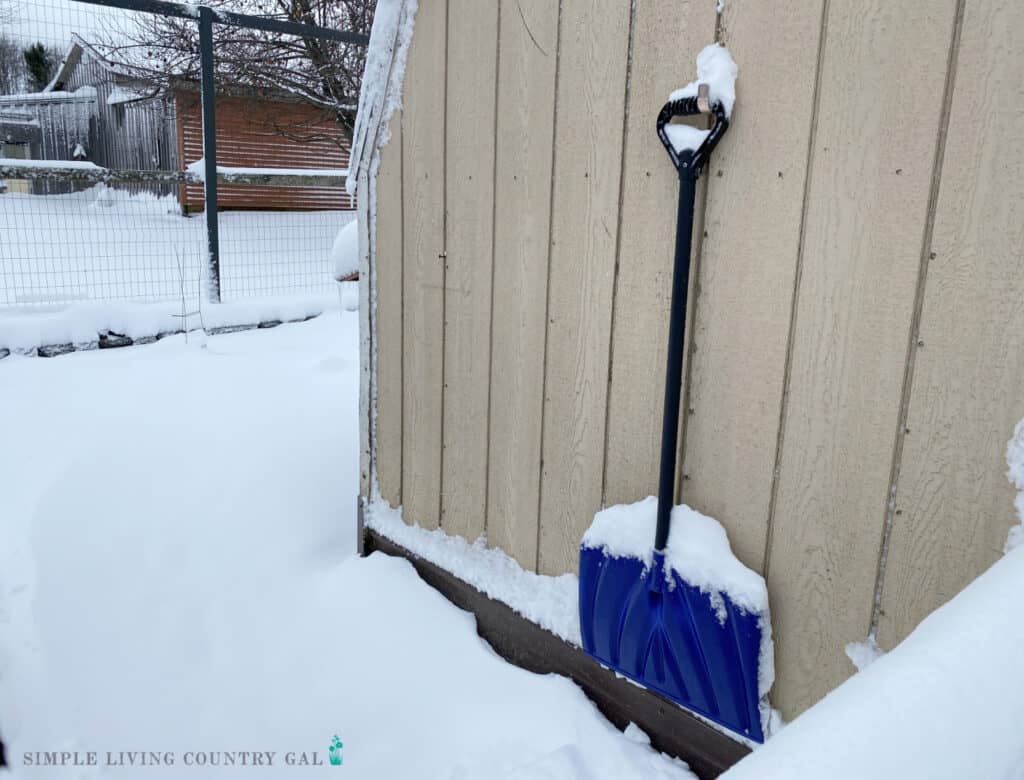
#3. Add a Layer of Protection
You may also want to add straw or wood chips to the pathway for extra insulation and traction.
#4. Provide Water
We like to have an additional bowl of water outside of the coop for any hens that are out free-ranging for the day. A rubber bowl works great in cold weather and stands up well to the temps.
#5. Set Up Overhangs
An overhang can really help to keep snow from piling up in different outside areas giving better access to the grass and ground.
#6. Control Drifting
If winds are an issue where you live, a drift board can be quite helpful in keeping the snow out of different areas.
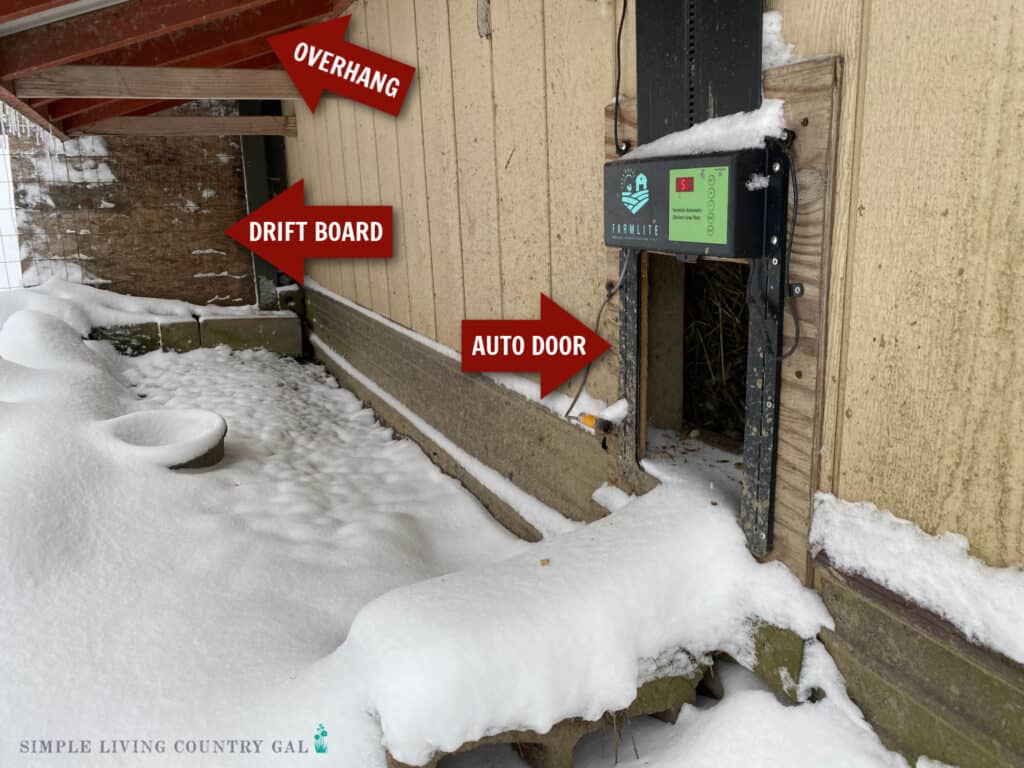
Coop Tips for Warmer Chickens
Let’s cover a few tips for keeping the inside of the coop warmer for your flock.
#1. Use Extra Bedding
By adding extra bedding, you create layers that will help keep the heat in. This is especially important for keeping your chickens warm while they roost at night.
#2. Insulate
If you live in an area with harsh winters, adding insulation to the coop can make a big difference in maintaining warmth. You can use materials such as straw bales or foam boards to insulate the walls and roof.
Chicken Water Heater 15 in for 5 Gallons Chicken Drinker, 125W Poultry Waterer Heated Base with Thermostat and 9.8ft Power Cord for Metal Drinking Fountains Chicken Coop


#3. Provide Ventilation
While it may seem counterintuitive, proper ventilation in the coop is crucial for keeping your chickens warm. This will prevent moisture from building up inside, which can lead to frostbite and other health issues for your flock. Just be sure to place vents near the top of the coop to avoid drafts.
#4. Use a Heat Source
In extremely cold temperatures, you may need to provide a supplemental heat source for your chickens. This can be in the form of a heat lamp, ceramic heater, or even a heated waterer. Just be sure to follow safety precautions and never leave heat sources unattended.
#5. Check for Drafts
Make sure to regularly check for any drafts in the coop, as they can quickly lower the temperature inside. These drafts can come from small cracks or holes in the walls, windows, or doors. Seal them up with weather stripping or caulk to keep your chickens cozy and warm.
#6. Keep Feeders Full
During colder months, your chickens will need extra energy to keep warm. Make sure to keep their feeders full with high-quality feed and provide treats such as scratch or mealworms to give them an extra boost.
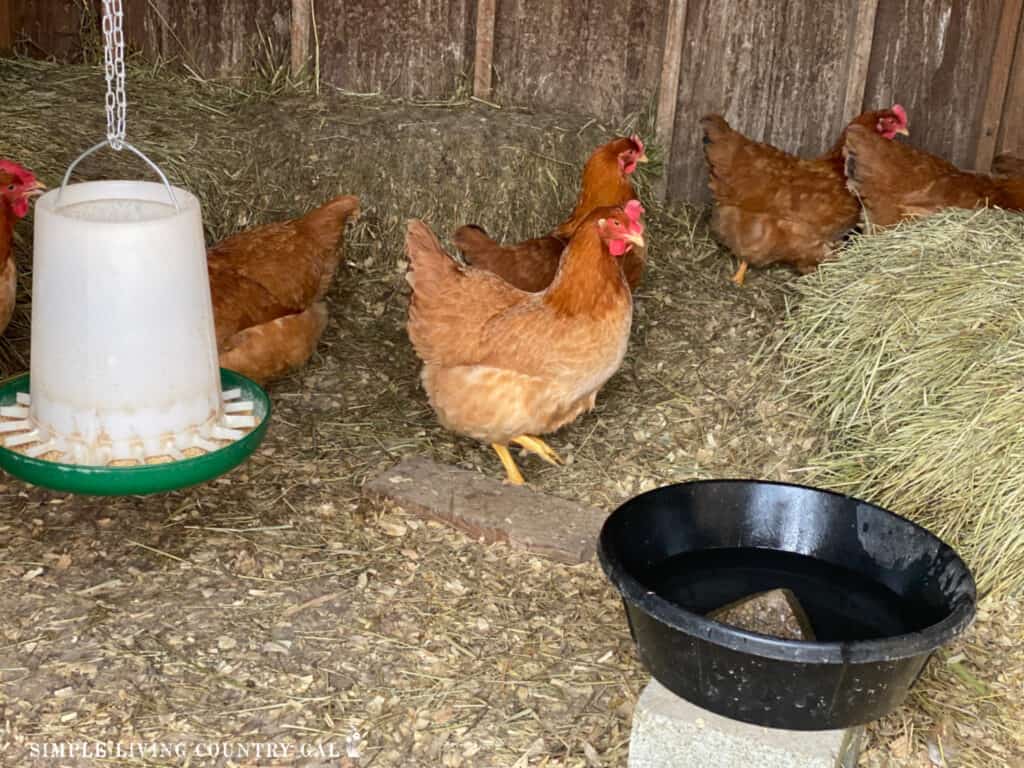
#7. Monitor Water Sources
During the winter, it’s important to regularly check your chickens’ water sources to make sure they are not frozen. Provide fresh, unfrozen water multiple times a day to ensure your chickens stay hydrated and healthy. You can also invest in heated waterers to prevent freezing.
#8. Keep Your Chickens Busy
Chickens can become bored during the winter months when they are cooped up inside, which can lead to negative behaviors like feather picking or egg eating. Keep your chickens busy by providing them with activities such as hanging treats, scattering scratch grains, or even giving them a cabbage to peck at. This will help keep their minds stimulated and prevent destructive behaviors.
Signs that your chickens may be too cold.
- Huddling together: If you notice your chickens huddled together in a corner or under their heat source, it’s a sign that they are trying to conserve body heat.
- Decreased egg production: Cold temperatures can cause stress on your chickens’ bodies and disrupt their egg-laying process.
- Pale combs and wattles: The combs and wattles of your chickens are particularly vulnerable to cold temperatures. If you notice them turning pale or white, it could be a sign that your chickens are too cold.
- Frostbite: In extreme cases, chickens can develop frostbite on their combs, wattles, feet, or even their legs. Keep an eye out for any discoloration in these areas, and take necessary precautions to protect your chickens from the cold.
Keeping your free-range chickens warm in the winter is an important part of raising a healthy and robust flock. By following these tips, you can ensure that your chickens are comfortable and thriving even in the coldest of temperatures. Remember to provide them with a warm shelter, fresh, unfrozen water, protection from the snow, and activities to keep them busy. With proper care and attention, your chickens will thrive during the winter season.
More Winter Care Chicken Tips:
- How to Prepare Chickens for Winter
- Cold Hardy Chicken Breeds
- How to Keep Chickens Warm in Winter Without Electricity








